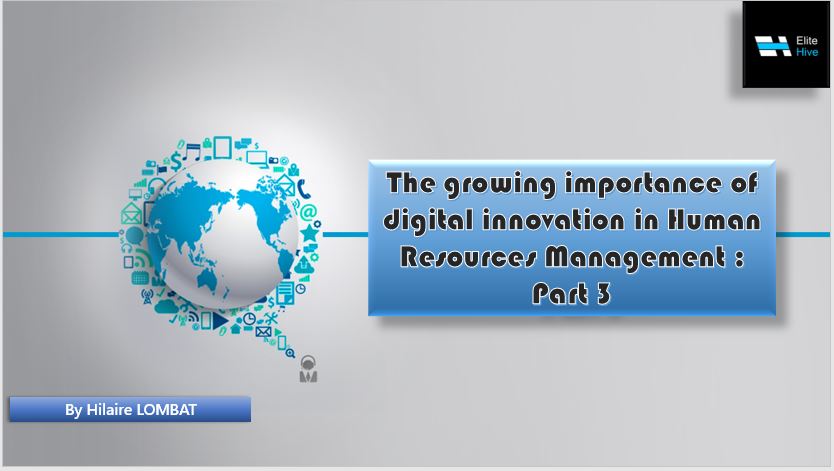- Du savoir faire au faire savoir.
- +237 6 61 51 51 31
- +237 6 94 25 39 19
- gitech@gitech.info
[HRM] [DIGITAL CHANGES]The growing importance of digital innovation in Human Resources Management part 3

[Marketing Digital] [SEO] Comment trouver des mots-clés pour son site ?
12 octobre 2019
[GRH] [DIGITALALISATION] E-GRH et E-DRH au Cameroun
30 décembre 2019User Review
( votes)As we stated in our previous articles, links are below, Human resources managers or simply managers are in need of new competencies the help their organizations in any technological change management.
We can easily sort these news skills with the new terms that are used to qualify HRM by organizations nowadays.
STRATEGIC PARTNER
This is all about HRM being engaged in the strategy formulation decision making. When an organization is undertaking mid or long-term projects, HR plays a key role in assessing if the required skills and human resources are available for those projects. Their analysis being followed by the acceptance or the rejection of some projects. This in turn will have an impact in the Corporate Strategic Plan and its associated analyses. (Boudreau, Lawler, 2009) research helped IBM establish the fact that there was a strong correlation in their results concerning HR having a strategic role and strategic activities they were involved in.
CHANGE AGENT AS HUMAN RESOURCES POLICY BRANCH
Performance improvement is really about the process of setting expectations and meeting them. The focus in business isn’t only about meeting specific goals, how you achieve them is also important. And the ‘’ how’’ impact the liabilities you create in the process. That ‘’ how’’ is all about rules and consequences of breaking those rules. Setting clear and specific behavioral standards in the form of rules establishes a framework for spotting and addressing violation. By updating these rules when needed, the HRM can act as a change agent. Those updates helping the employees in getting accustomed gradually to those changes in their every day’s behaviors.
ADMINISTRATIVE EXPERT
This is all about HRM often providing expertise in a shared service center. They act more as a consultant to senior management. Continuously helping the organization in minimizing risk of fines, penalties and lawsuits by managing immigration, safety, confidentiality and labor regulations, requirements and restrictions. Unlocking the cost- and time-saving benefits of technology with human resources information systems.
Under this new paradigm of roles and responsibilities, HR professionals must develop new competencies. Competencies needed to fulfill the roles of strategic partner, change agent, employee champion, and administrative expert.
HRM TODAY
With the shift to new roles and the introduction of new, powerful HR technologies, the required set of HR competencies have also changed. Promoted by organizations such as SHRM and the HR Certification Institute (HRCI). HR competencies in the twenty-first century differ from those in the twentieth century. Primarily because of the need for skills that are technology related. For instance, with the advent of social media, necessary communication skills include an understanding of how to create and share content through media for HR purposes.
Critical analysis skills must include an understanding of how to use big data to inform HR decisions. In 2015, HRCI collected over thirty thousand worldwide surveys rating the competencies and performance of more than four thousand HR professionals in 1,500 organizations. In accordance with this study, SHRM provides a set of nine competencies for the HR professional. The two of them being related to technology communication and critical evaluation.
Let’s conclude,
The Human Resources Management has deeply evolved with the time passing and the technologies growing. Our work was about the answering the question: With ever-increasing importance of computer tools in human resource management and the ever-increasing computerization of personnel administration, would it not be necessary to redefine the basic skills of a human resources manager?
In our work, we struggled to present at first the impact of technologies in Human Resources practices. Going from the HR fields impacted by these digital innovations to few specific processes impacted by these digital innovations. Then we reviewed how a Human resources manager can help employees in an organization when digital changes are happening. At first presented the obstacles to a smooth change in an organization. Then we presented the strategies that a human resource manager can use to make it happen smoothly. At the last part, we talked about the new competencies needed to fulfill the role of HR manager.
In conclusion, it’s obvious now that the answer to our question is yes.
It is necessary to redefine the basic skills of a human resources manager because the old way of the human resource manager is clearly not up to date.
Thank you for taking the time to read this article.
To follow my news, you can join me on my other social networks:
- Facebook : https://www.facebook.com/HilaireLombatOfficiel
- LinkedIn : https://www.linkedin.com/in/hilaire-lombat/
For any reactions do not hesitate to leave a comment.
How useful was this post?
Click on a star to rate it!
No votes so far! Be the first to rate this post.

